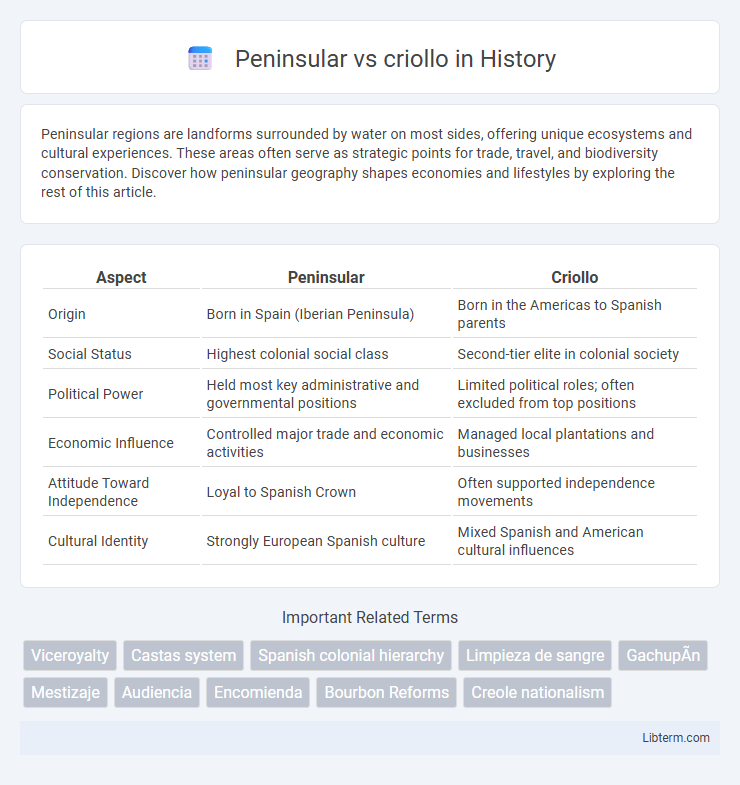Peninsular regions are landforms surrounded by water on most sides, offering unique ecosystems and cultural experiences. These areas often serve as strategic points for trade, travel, and biodiversity conservation. Discover how peninsular geography shapes economies and lifestyles by exploring the rest of this article.
Table of Comparison
| Aspect | Peninsular | Criollo |
|---|---|---|
| Origin | Born in Spain (Iberian Peninsula) | Born in the Americas to Spanish parents |
| Social Status | Highest colonial social class | Second-tier elite in colonial society |
| Political Power | Held most key administrative and governmental positions | Limited political roles; often excluded from top positions |
| Economic Influence | Controlled major trade and economic activities | Managed local plantations and businesses |
| Attitude Toward Independence | Loyal to Spanish Crown | Often supported independence movements |
| Cultural Identity | Strongly European Spanish culture | Mixed Spanish and American cultural influences |
Introduction to Peninsular and Criollo Distinction
The Peninsular and Criollo distinction refers to the social hierarchy in colonial Spanish America, where Peninsulares were Spanish-born individuals residing in the colonies, while Criollos were those of Spanish descent born locally. Peninsulares held dominant political and administrative positions, often monopolizing key governmental roles and privileges. Criollos, despite their wealth and influence, faced social and political restrictions, fueling tensions that contributed to independence movements throughout Latin America.
Historical Background of Spanish Colonial Society
Peninsulares were Spanish-born elites who held the highest administrative and ecclesiastical positions in colonial Latin America, while Criollos were American-born descendants of Spaniards often marginalized politically despite their wealth. The Spanish colonial social hierarchy placed Peninsulares at the top to maintain imperial control, creating tensions that fueled early independence movements. This distinction shaped the political and social struggles during the colonial era, influencing the development of national identities across Latin America.
Definitions: Who Were the Peninsulares?
Peninsulares were Spanish-born individuals who migrated to the Americas during the colonial period and held the highest social and political status in the hierarchy of Spanish colonies. They were distinct from Criollos, who were of Spanish descent but born in the Americas, often leading to tensions due to disparities in privileges and power. The term "Peninsular" specifically denotes origin from the Iberian Peninsula, emphasizing their direct connection to the Spanish Crown and its administrative authority.
The Rise of the Criollo Class in the Colonies
The rise of the Criollo class in the colonies marked a significant shift in social and economic power during the Spanish colonial period. Unlike the Peninsulares, who were born in Spain and held the top governmental and ecclesiastical positions, Criollos were American-born Spaniards who increasingly controlled local commerce, landholdings, and political influence. This growing power base of the Criollos fueled desires for autonomy and played a crucial role in the independence movements across Latin America.
Socioeconomic Roles and Power Structures
Peninsulares, born in Spain, occupied the highest socioeconomic status in colonial Latin America, dominating political offices, administrative roles, and ecclesiastical positions, thereby consolidating power within imperial structures. Criollos, though wealthy landowners and influential merchants born in the Americas, were systematically excluded from top-tier governance and faced discrimination despite their economic contributions. This hierarchical division entrenched social stratification, fueling tensions and eventual movements for independence led predominantly by the discontented criollo elite.
Cultural Differences and Identity Formation
Peninsular Spaniards, born in Spain, often maintained European cultural norms and social dominance, shaping colonial identity with a strong allegiance to the Spanish Crown. Criollos, born in the Americas of Spanish descent, developed distinct cultural identities blending indigenous, African, and European influences, fostering early nationalist sentiments. These identity formations deepened social stratification and fueled cultural differentiation in colonial Latin America.
Legal Rights and Privileges under Colonial Rule
Peninsulares, born in Spain, held superior legal rights and privileges under colonial rule, including exclusive access to high-ranking government and church positions. Criollos, born in the Americas of Spanish descent, faced legal restrictions limiting their political power and access to elite offices despite their European lineage. This institutionalized hierarchy entrenched social divisions and fueled tensions leading to independence movements in Latin America.
Sources of Tension and Rivalry
Peninsulares, born in Spain, held top colonial administrative and ecclesiastical positions, creating resentment among Criollos--those of Spanish descent born in the Americas--who were often excluded from high-ranking offices despite their wealth and local influence. This systemic discrimination fueled deep social and political tension, as Criollos sought greater autonomy and recognition within colonial governance structures. Economic disparities and competition over land and trade further intensified rivalry, setting the stage for independence movements across Latin America.
Impact on Independence Movements
Peninsulares, Spanish-born elites, dominated colonial administrations, fueling resentment among Criollos, American-born Spaniards who sought political power and economic control. This social divide intensified discontent, driving Criollos to lead key independence movements throughout Latin America in the early 19th century. The conflict between Peninsulares' loyalty to the Spanish Crown and Criollos' aspirations for autonomy fundamentally shaped the trajectory and success of liberation efforts.
Lasting Legacy in Contemporary Latin America
Peninsulares, Spanish-born elites, and Criollos, American-born individuals of Spanish descent, shaped the social hierarchies and political structures of Colonial Latin America, with Criollos ultimately leading independence movements across the continent. The enduring legacy manifests in contemporary Latin America's cultural identity and social dynamics, where socio-economic divisions often trace back to colonial-era distinctions between these groups. Modern Latin American nationalism and mestizo identity reflect the fusion and conflicts rooted in the Peninsular versus Criollo divide.
Peninsular Infographic

 libterm.com
libterm.com